- Home
- Hermann Hesse
Klingsor's Last Summer Page 14
Klingsor's Last Summer Read online
Page 14
On the last day they tramped together through the golden valleys. Louis was in excellent humor; departure was the spring of life to his migratory bird’s heart. Klingsor fell in with his mood. Once again they had found the old, easy, playful and mocking tone, and this time they did not let it slip. In the evening they sat in the tavern garden. They had fish baked specially for them, had rice with mushrooms to go with it, and poured maraschino over peaches.
“Where are you bound for tomorrow?” Klingsor asked.
“I don’t know.”
“Are you going to join that beautiful woman?”
“Yes. Perhaps. Who can tell? Don’t ask too many questions. Now, at the end, let’s have another good white wine. I’m in favor of a Neuchâtel.”
They drank. Suddenly Louis exclaimed: “It’s a good thing I’m leaving, old seal. Sometimes, when I sit beside you like this, like now, for instance, something utterly silly occurs to me. It occurs to me that here and now the only two painters our good country can boast of are sitting together, and then I have a horrible feeling in my knees, as if the two of us were cast in bronze and standing hand in hand on a monument, you know, like Goethe and Schiller. After all, it’s not their fault that they’re condemned to stand there forever holding each other’s bronze hands and that they gradually come to seem so odious and such a damned nuisance to us. Maybe they were perfectly decent fellows—years ago I read a play by Schiller that was pretty good. And yet this is what’s happened to him now, he’s become a monument and has to stand beside his Siamese twin and you see their collected works standing on shelves and hear them analyzed in the schools. It’s gruesome. Imagine a professor a hundred years from now preaching to his students: Klingsor, born in 1877, and his contemporary Louis, nicknamed The Glutton, innovators in painting, liberation from the naturalism of color, when we examine this pair of artists closely we find three clearly distinguishable periods! I’d rather throw myself under a locomotive right here and now!”
“It would make more sense to throw the professors under it.”
“There aren’t any locomotives that big. Our technology is so small-scale.”
Stars were already rising. Suddenly Louis clinked glasses with his friend.
“All right, one more toast and let’s drink it down. Then I’ll mount my wheel and goodbye. Let’s not have any long partings. Cheers, Klingsor!”
They touched glasses and drank. In the garden Louis mounted his bicycle, swung his hat, was gone. Night, stars. Louis was in China. Louis was a legend.
Klingsor smiled sadly. How he loved this migratory bird! For a long time he stood on the gravel in the tavern garden, gazing down the empty street.
The Day at Kareno
TOGETHER WITH HIS FRIENDS from Barengo and with Agosto and Ersilia, Klingsor set out on the walk to Kareno. Early in the morning they descended among the strongly scented spireas, the bedewed spider-webs quivering on the margins of the woods, down through the steep, warm forest into the valley of Pampambio where beside the yellow road bright yellow houses slept, bent forward and half dead, stunned by the summer days. By the dried-up stream bed the white metallic willows hung heavy wings over golden meadows. A colorful troupe, the friends bowled down the rosy road through the misty green of the valley: the men white and yellow in linens and silks, the women white and pink, Ersilia’s Veronese green parasol sparkling like a jewel in a magic ring.
“It’s a pity, Klingsor,” the doctor remarked plaintively in his kindly voice. “Your wonderful watercolors will all be white in ten years. These colors you like so well have no lasting qualities.”
“Yes,” Klingsor said, “and what is worse, Doctor: your fine brown hair will all be gray in ten years, and a little while later all our good gay bones will be lying in some hole in the ground, including, alas, your beautiful and healthy bones, Ersilia. My friends, let’s not start becoming sensible so late in life. Hermann, how does Li Po put it?”
Hermann the Poet stood still and intoned:
Life passes like a flash of lightning
Whose blaze barely lasts long enough to see.
While the earth and the sky stand still forever
How swiftly changing time flies across man’s face.
O you who sit over your full cup and do not drink,
Tell me whom you are still waiting for?
“No,” Klingsor said, “I mean the other poem, the rhymed one, about the hair that was still dark at morning.…”
Hermann promptly recited:
Only this morning your hair gleamed silken and black,
Evening has already sprinkled it with snow.
If you would not suffer as on the rack
Hold out your cup and summon the moon for your drink-fellow.
Klingsor laughed heartily in his somewhat hoarse voice.
“Good old Li Po! He had inklings; he knew all sorts of things. We know all sorts of things too—he is our wise old brother. This giddy day would please him. It’s just the kind of day lovely for dying Li Po’s death at evening, in the boat on the quiet river. You’ll see, everything is going to be wonderful today.”
“What kind of death was it that Li Po died on the river?” Martha, the artist, asked.
But Ersilia interrupted in her dear, deep voice: “Stop it now. I’ll begin detesting anybody who says another word about death and dying. Finisca adesso, brutto Klingsor!”
Laughing, Klingsor came over to her. “How right you are, bambina! If I say another word about dying you can poke your parasol into both my eyes. But seriously, ‘tis a glorious day, my dears. A bird is singing today, a bird out of a fairy tale—I heard it once before this morning. A wind is blowing today, a wind out of a fairy tale, the child of heaven who wakens the sleeping princesses and blows reason clear out of people’s heads. A flower is blossoming today, a flower out of a fairy tale, it’s blue and blooms only once in a lifetime and whoever plucks it wins bliss.”
“Did all that mean anything?” Ersilia asked the doctor.
Klingsor heard her.
“What it all meant is: this day will never come again and anyone who fails to eat and drink and taste and smell it will never have it offered to him again in all eternity. The sun will never shine as it does today; it is in a constellation in the sky, a conjunction with Jupiter, with me, with Agosto and Ersilia and all of us, a conjunction that will never come again, not in a thousand years. And therefore I want to walk on your left side for a while, because that brings luck, and carry your emerald parasol—under its light my head will look like an opal. But you must play your part and sing a song, one of your best.”
He took Ersilia’s arm. His sharp features dipped softly into the blue-green shade of the parasol. He had fallen in love with it; its blatant, sweet color delighted him.
Ersilia began to sing:
Il mio papà no vuole,
Ch’io spos’ un bersaglier—
Voices joined in; singing, they walked on to the forest and into the forest, until the climb became too steep. The path led sharply upward like a ladder through the fern, scaling the great mountain.
“What a marvelous straight line this song takes!” Klingsor praised it. “Papa is against the lovers, just as he always is. They take a knife that cuts well and stab Papa to death. He’s gone. They do it at night, nobody sees them but the moon, who doesn’t betray them, and the stars, who are mute, and God, who’s going to forgive them after all. How beautiful and sincere that is. A poet of the present day would be stoned for writing such a thing.”
They climbed the narrow mountain path in the sun-splashed shadows of the chestnuts. When Klingsor looked up he saw before his face the slender calves of Martha, the artist, showing pink through her transparent stockings. If he looked back, the green of the parasol arched above Ersilia’s curly black hair. Underneath she was silken violet, the only dark patch among all these figures.
At a blue and orange farmhouse fallen summer apples lay in the meadow, cool and sour. They tasted them. Martha spoke enthusiasti
cally about an outing on the Seine, in Paris, before the war. Ah yes, Paris, and the bliss of those days.
“That will never come again. Never again.”
“Nor ought it to,” the painter exclaimed vehemently, shaking his sparrow-hawk’s head fiercely. “Nothing ought to come again. Why should it? What childish wishes! The war has glossed over everything in the past, turning it all into a paradise, even the most idiotic things, the things we could well do without. Very well, it was lovely in Paris and lovely in Rome and lovely in Arles. But is it any less lovely today, right here? Paradise isn’t Paris and peacetime, Paradise is here. It lives up there on the mountain and in an hour we’ll be in the midst of it and will be the thieves to whom it was said: This day you will be with me in Paradise.”
They broke out of the mottled shade of the woods path onto the broad open highway that soared, bright and hot, in great spirals to the summit. Klingsor, his eyes shielded by his dark-green glasses, walked last in line, and often fell behind to watch the others moving and see the colored combinations they formed. He had deliberately taken nothing with him for working, not even his small notebook; and nevertheless he stood still a hundred times, stirred by pictures. His gaunt figure stood alone, showing white against the reddish gravel of the road, at the edge of a grove of acacias. Summer breathed hotly upon the mountain. Light poured vertically down. Color steamed multifold out of the depths. Above the nearest mountains, their greens and reds harmonizing with white villages, bluish ridges peered; and beyond, paler and bluer, more and more ridges. Very far away and unreal rose the snow-capped crystalline peaks. Above the acacias and chestnut trees the mighty rocky wall and humpbacked summit of Monte Salute emerged, reddish and light purple. But the people were more beautiful than all the rest. Like flowers they stood in the light beneath the greenery. The emerald parasol glowed like a giant scarab. Ersilia’s black hair beneath it, the white slender painter Martha with her rosy face, and all the others. Klingsor drank them in with a thirsty eye, but his thoughts were with Gina. He would not be able to see her for another week. She was sitting in an office in the city, working away at the typewriter; he seldom managed to see her, and never alone. And he loved her, her more than all the others, though she knew nothing about him, did not understand him, regarded him as a strange rare bird, a famous foreign painter. How strange that was, that his longings should cling to her alone, that no other love satisfied him. It was not like him to go far out of his way for a woman. But he did for Gina, in order to be beside her for an hour, to hold her small slender fingers, to thrust his shoe beneath hers, to imprint a quick kiss on the nape of her neck. He thought about that, a droll puzzle to himself. Was this already the turning point? Old age already coming on? Was it only that, the December–May impulse of the man of forty for the girl of twenty?
They had reached the ridge, and beyond, a new world flung itself at their eyes: Monte Gennaro, high and unreal, piled up out of endless steep, sharp pyramids and cones, the sun aslant behind it, each plateau glistening enamel floating on deep violet shadows. Between it and themselves the vast areas of shimmering air, and lost in infinite depths the narrow blue arm of the lake, resting amid the green flames of the forest.
There was a tiny village on the summit: a smallish manor house, four or five other houses, of stone, painted blue and pink, a chapel, a fountain, cherry trees. The company paused by the fountain in the sunlight. Klingsor walked on, through an arched gateway into a shadowy farmyard. Three bluish buildings stood tall in it, with only a few small windows, grass and gravel between them, a goat, nettles. A child ran away from him; he coaxed her to come back, took chocolate from his pocket. The child stopped; he caught her, caressed her, and pressed the chocolate upon her. She was shy and lovely, a dark-brown girl with the alarmed black eyes of a small animal, slender bare legs, brown and gleaming. “Where do you live?” he asked her. She ran to the nearest open door in one of the clifflike houses. From a dark stone room like a primeval cave a woman stepped, the child’s mother; she too accepted chocolate. Above dirty clothing the brown throat rose, a firm-muscled, broad face, sun-tanned and beautiful, a broad full mouth, large eyes, crude sweet charm. Those large Asiatic features quietly bespoke sexuality and motherhood. He leaned seductively toward her; smiling, she held him off, drawing the child between them. He walked on, resolved to return. He wanted to paint this woman, or be her lover, if only for an hour. She was everything: mother, child, mistress, animal, madonna.
Slowly, he returned to the group, his heart full of dreams. On the wall of the estate, whose house seemed empty and locked, crude old cannonballs had been affixed. A whimsical stairway led through shrubbery to a grove and hill with a monument atop it. There, baroque and solitary, stood a bust: Wallenstein costume, curls, tapering wavy beard. Ghosts and phantasms shimmered around the mountain in the glaring midday light. Strange things lurked; the world was tuned to another, remote key. Klingsor drank at the fountain. A swallowtail butterfly flew close and sucked at the sprinkled drops on the limestone rim of the fountain.
The mountain road led along the ridge under chestnuts and walnuts, in sun and shade. At a bend there was a wayside chapel, old and yellow, faded old pictures in the niche, a saint’s head, angelically sweet and childlike, a patch of her red and brown garment, the rest crumbled away. Klingsor loved old pictures, especially when they came his way unlooked for; he loved such frescoes; he loved the way these beautiful works returned to dust and the earth.
More trees, vines, dazzling hot road. Another turn: there was their destination, suddenly, unexpectedly: a dark arched gateway, a large tall church of red stone, crashing with self-assurance against the sky, a plaza full of sunlight, dust and peace, grass parched to redness, crackling underfoot, noonday light reflected by glaring walls, a column, a figure atop it, invisible in the blaze of sunlight, a stone balustrade around the broad plaza poised over an infinity of blue. Beyond, the village of Kareno, ancient, narrow, densely dark, Saracen, gloomy stone caves under faded brown brick, lanes oppressively narrow as in a dream and full of darkness, small squares suddenly shrieking aloud in white sunlight, Africa and Nagasaki, above the forest, below the blue abyss, higher still the white, plump, saturated clouds.
“It’s funny how much time we need before we know our way around in the world just a little,” Klingsor said. “Once when I was going to Africa, years ago, I passed by this place in an express train, three or five or six miles away, and knew nothing about it. From Africa I went on to Asia, and at the time it was terribly necessary that I do so. But everything I found there I am finding here today: primeval forest, heat, beautiful alien people without nerves, sunlight, temples. It takes so long to learn to visit three continents in a single day. Here they are. Welcome, India! Welcome, Africa! Welcome, Japan!”
The friends knew a young lady who lived up here, and Klingsor was greatly looking forward to meeting the unknown woman. He called her the Queen of the Mountains; that was the title of a mysterious Oriental story in the books of his boyhood.
Expectantly, the caravan penetrated the blue-shaded gorge of the lanes. Not a person, not a sound, not a chicken, not a dog. But in the semishade of a window embrasure Klingsor saw a silent figure standing, a lovely girl, black-eyed, red kerchief around her black hair. Her gaze, lying in wait to capture the stranger, struck his. For the span of a long breath they looked fully, gravely into each other’s eyes, two alien worlds momentarily close. Then both smiled briefly, the heartfelt eternal greeting of the sexes, the old, sweet, devouring enmity, and with a step around the corner of the house the stranger had fled away and been placed in the girl’s hope chest, a picture among many pictures, a dream among many dreams. The small thorn pricked Klingsor’s never-satiated heart; for a moment he hesitated and thought to turn back. Agosto called him; Emilia began to sing; a shadowy wall vanished and a small, brilliant square with two yellow palazzi lay still and dazzling in the enchanted noon: narrow stone balconies, closed shutters, a glorious stage for the first act of an opera.
<
br /> “Arrival in Damascus,” the doctor called out. “Where does Fatima live, the pearl among women?”
The answer came, surprisingly, from the smaller palazzo. Out of the cool blackness behind the half-closed balcony door a strange tone sounded, then another, and the same repeated ten times, then the octave ten times—a piano was being tuned, a melodious piano in the middle of Damascus.
This must be it; this was where she lived. But the house seemed to lack an entrance; there was only the yellow wall with two balconies, and above them a bit of painting in the stucco of the gable: blue and red flowers and a parrot. There should have been a painted door here and if you knocked three times and pronounced Open Sesame the painted door would fly open and the wanderer be greeted by aromatic fragrances, with the Queen of the Mountain seated on a high dais, behind veils, slave girls cowering on the steps at her feet and the painted parrot flying screeching to her mistress’s shoulder.
They found a tiny door in a side street. A loud bell, a devilish mechanism, clanged angrily. A small staircase, narrow as a ladder, led upward. Impossible to imagine how the piano had ever been brought into this house. Through the window? Through the roof?
A large black dog came rushing, a small blond lion after him. A burst of noise; the stairs rattled; in the background the piano sang the same tone eleven times. Sweetly soft light poured out of a room coated with a pinkish whitewash. Doors slammed. Where was the parrot?
Suddenly the Queen of the Mountains stood there, a slender lissome flower, body straight and pliant, all in red, burning flames, image of youth. Before Klingsor’s eyes a hundred beloved pictures scattered away and the new picture radiantly took their place. He knew at once that he would paint her, not realistically, but the ray within her that had struck him, the poem, the tart lovely tone: youth, Redness, Blondness, Amazon. He would look at her for an hour, perhaps several hours. He would see her walking, sitting, laughing, perhaps dancing, perhaps hear her singing. The day was crowned; the day had been given its meaning. Anything else that might come was pure gift, superfluity. It was always this way: an experience never came alone. Its birds always flew ahead, there were always harbingers and omens: the Asiatic maternal animal look in that doorway, the black-haired village beauty in the window, and now this.

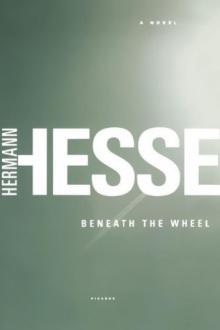 Beneath the Wheel
Beneath the Wheel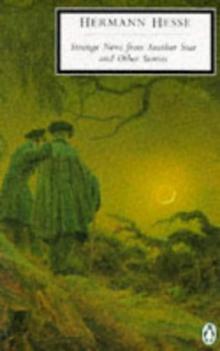 Strange News From Another Star
Strange News From Another Star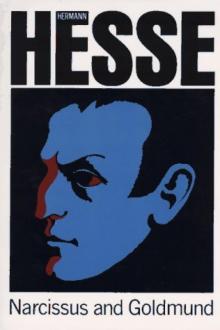 Narcissus and Goldmund
Narcissus and Goldmund Steppenwolf
Steppenwolf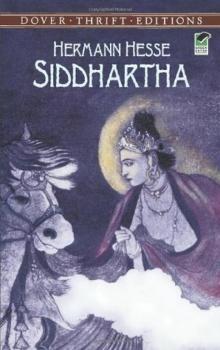 Siddhartha
Siddhartha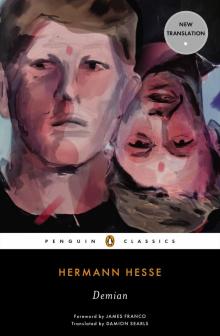 Demian
Demian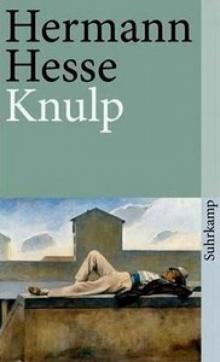 Knulp
Knulp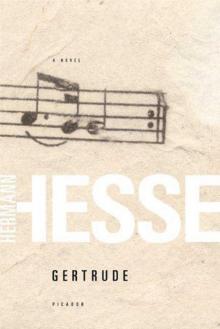 Gertrude
Gertrude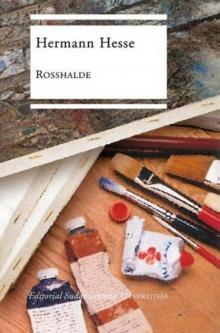 Rosshalde
Rosshalde The Glass Bead Game
The Glass Bead Game The Journey to the East
The Journey to the East Klingsor's Last Summer
Klingsor's Last Summer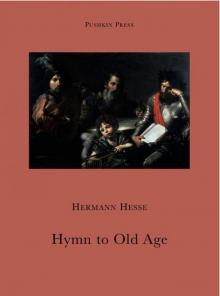 Hymn to Old Age
Hymn to Old Age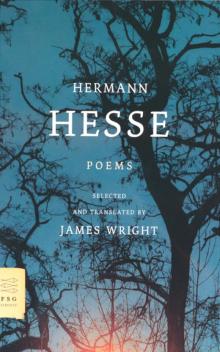 Poems
Poems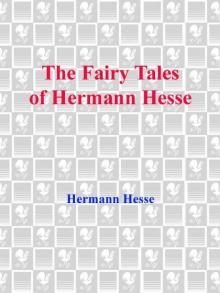 The Fairy Tales of Hermann Hesse
The Fairy Tales of Hermann Hesse Singapore Dream and Other Adventures
Singapore Dream and Other Adventures Soul of the Age
Soul of the Age